
 |
|
| |||||||||||
|
The 2012 Tallgrass Film Festival
GREETINGS FROM THE 2012 TALLGRASS FILM FESTIVAL 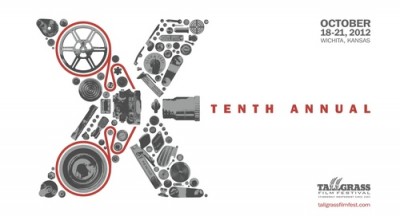 We've got some history, the Tallgrass Film Festival and I. When the festival started back in 2003 in my hometown of Wichita, Kansas, I wasn't just covering it for my local alt-weekly; I had a short film playing in it, back in the days when I thought I might be able to do some damage on the other side of the screen. I was present for the first three years of Tallgrass, before moving away to New York, and this was my first year there since 2005. It's grown in leaps and bounds in the years since, from (basically) a start-up to a terrific festival, and this year's line-up was a deftly curated mix of great titles from the festival circuit and new films from lesser-knowns. A few highlights: 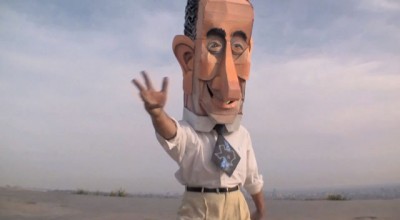 BEST OF THE FEST Beauty is Embarrassing: Neil Berekely's documentary profile of renaissance man Wayne White (art designer, painter, sculptor, puppeteer, banjo picker) is blessed with the presence of a truly entertaining character at its center: White's got a great, cockeyed sense of bizarre sense of verbal and visual humor. One of the many pleasures of Berkeley's giddily enjoyable film is the degree to which it works itself onto his wavelength--the style and pace of the film captures (and, at its best, replicates) his dry, disarming wit. It's a fun movie to watch, but it also carries an always-welcome message of finding your voice and expressing it as best you can. MORE GREAT DOCS Paul Williams Still Alive: A witty, lively, first-person documentary by Stephen Kessler, a child of the '70s who tracks down then-ubiquitous singer/songwriter/actor Paul Williams and tries to figure him out. The result offers something of a best of both worlds scenario; it slyly inverts the bio-doc tropes, yet also works as the kind of back-from-the-brink-of-obscurity tale that those films tell so well. Year of the Living Dead: This well-crafted look at George A. Romero's 1968 classic Night of the Living Dead is part biography, part behind-the-scenes feature, and part sociological study. Director Rob Kuhns explores Night in its most compelling form: as a metaphor and commentary on then-current events. As with many groundbreaking films, much of what it does has been so often duplicated that it's become hard to appreciate the source. Night has been separated from its time, and one of the finest qualities of Year of the Living Dead is how expertly it positions the picture back within that framework.  Pablo: Good documentary films can do a lot of things--educate, inform, immerse us in a scene, tell a story. Richard Goldgewicht's Pablo does those things, and something else besides: it wants to tell you all about this amazing guy that you totally should have heard of before now, but probably haven't. Pablo Ferro is a self-taught animator, comic book artist, advertising creator, and one of the genuine artists of movie title design. If that all sounds too "inside," it's not; this is the story of a creative artist with a unique, idiosyncratic style that changed the game. It's a bewitching little documentary, a tale relayed with grinning style and wide-eyed enthusiasm. The Right to Love: An American Family: When you're talking about gay marriage, it is very easy to deal with it in the abstract--to talk about "gay couples" as a thing rather than as individual people. The masterstroke of Cassie Jaye's documentary is its very deliberate decision to put faces to those place-markers, to introduce us to the kind of strikingly average, proudly "normal" family affected by Proposition 8. The Right to Love makes for occasionally problematic filmmaking, but it is admirably focused on helping facilitate the recognition and personification that's so vital to this fight. Booker's Place: A Mississippi Story: Raymond De Felitta's riveting documentary looks back at his father's 1967 NBC News documentary, Mississippi: A Self Portrait, and a black man named Booker Wright who gave an astonishingly candid interview about how the races really interacted in that state, at that time. De Felitta examines the story of Booker Wright from several angles: by looking at how his father made the film, and why; by creating a portrait of that particular time and place; and by investigating Wright's life before it intersected with his father's, and what happened to him after. In doing so, he gives us the entire story of the civil rights movement, writ small: injustices finally exposed, in the voices of ordinary people. Booker's Place is effortlessly moving and endlessly powerful; this is an exemplary film. Ai Weiwei: Never Sorry: This up-close portrait of the life and work of Chinese visual artist Ai Weiwei is fascinating, ballsy, and more than a little scary. A big bear of a man with a cool demeanor and a pronounced distaste for authority, he's a movie star in waiting; I'm amazed it took someone this long to make if official. Director Alison Klayman adopts an intimate, vérité-style approach that seems appropriate to the subject at hand; he's a righteous man but an informal one, and several scenes amount to hanging out and talking theory and ideals. Like its subject, Never Sorry is smart, boisterous, and provocative. The Invisible War: Kirby Dick's Sundance entry takes on the epidemic of rape--often unreported, mostly unpunished--in the military with fury and righteous indignation. It's an impeccably assembled documentary, gathering force as the stories and arguments are collected into an indictment of a broken, victimizing entity. This bitter, powerful film is a howl of anger and a cry of injustice. Side by Side: The motion picture itself has been an attractive subject to documentary filmmakers for years, but Side by Side may be the most "inside baseball" movie-about-movies to date--and that is its strength. Ostensibly a look at the current struggle (and transition) between traditional photochemical film and digital moviemaking, it is actually an exhaustively detailed "state of the cinema" thesis. For those of us who care about this stuff, it's a fascinating 100-minute think piece; the arguments are well articulated by exactly the voices you want to hear from. Brisk, lucid, and a lot of fun. Detropia: Heidi Ewing and Rachel Grady's terrific documentary examination of Detroit's economic free-fall has much to talk about, argue over, and ruminate on. But this deceptively casual film is less advocacy or exposé than portraiture--a multi-faceted, complicated portrait that offers no easy answers and no easy outs. Ewing and Grady capture something of this crumbling metropolis, and let the images speak for themselves. The result is a beautiful, thoughtful, and indisputably difficult motion picture 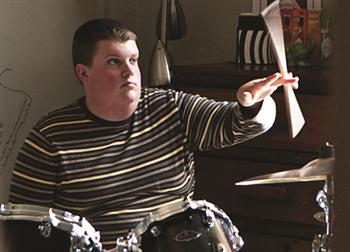 CHARMERS Brooklyn Brothers Beat the Best: Writer/director/co-star Ryan O'Nan's feature filmmaking debut has a unique, shambling charm all its own, with crackerjack turns by its well-matched protagonists and a soundtrack full of odd, wonderful little songs. It's got an oddball sense of humor and a good heart, as well as a mellow likability that reminded this viewer of Once. O'Nan's is a promising moviemaker, with a gift for quirky but relatable characters and organic musical spice. Fat Kid Rules the World: A likable, low-key feature directorial debut from Scream actor and '90s artifact Matthew Lillard, who here tells the tale of a high school outcast who finds something resembling confidence and self-identity through punk rock--but, more importantly, he finds a friend with problems of his own. It's a fairly sly piece of work, narratively speaking, inasmuch as you think it's going to be one kind of movie, and it subtly becomes something else. And if both movies are awfully familiar, its forgivable in a picture as fundamentally sweet as this one. The Kitchen: Ishai Setton's comedy/drama is wildly uneven, but it's got a snappy, conversational wit and outstanding performances by Laura Prepon, Tate Ellington, and (especially) Compliance's Dreama Walker. Often entertaining, occasionally engaging, and energetically staged. 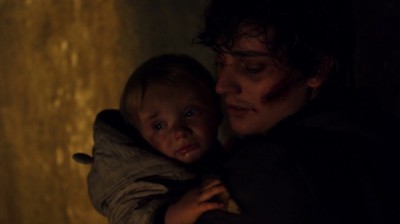 DARKER THOUGHTS Citadel: Cirian Foy's Irish chiller shifts gears sharply but never clumsily, gingerly skipping from drama to horror to introspection. It may require more diligence from audiences than they're accustomed to affording a genre picture--it's the kind of horror-movie-as-chamber-piece that legitimately recalls something like Repulsion. But it's an effective and thankfully restrained film, serious-minded, frequently unnerving, and moody as hell. Compliance: Craig Zobel's "inspired by true events" drama (that seems too mild a word--horror film, maybe?) has been dividing and astonishing audiences since Sundance, and for good reason: it's a tough movie to watch, a harrowing button-pusher, but masterfully executed and thought-provoking in a manner few films attempt anymore. 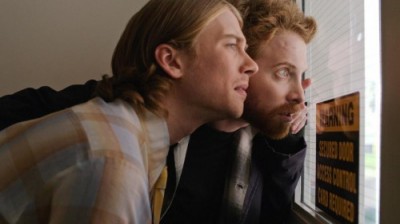 GOOD INTENTIONS, MEDIOCRE MOVIES Shouting Secrets: It's nice that Korinna Sehringer's drama about a Native American family is, for the most part, not explicitly about their ethnicity--she treats her characters as an average American family. Too average, in fact; it's such an oft-told story of familial conflict that we probably wouldn't be interested otherwise. It's an earnest movie, eager to please even, and while there are a few good scenes and a couple of noteworthy performances, it boils down to boilerplate melodrama: every character is given a dilemma, every dilemma manifests itself in the expected emotional blow-ups and statements of long-held resentments, and all are neatly fixed up by the picture's end. The Story of Luke: Lou Tayor Pucci and Seth Green are both very good in roles that are easy to overplay, but The Story of Luke should be a messier movie than it is; it's all a little too smooth and easy, the horny grandpa jokes and set-up/pay-off dialogue structure having a bit too much of a TV sitcom ring. Its heart is in the right place, and that goes double for the performers. But this appealing picture often has the feeling of a too-worked-out, too-well-oiled comedy/drama machine. Big thanks to the Tallgrass Film Festival for having me, and to GoWichita for making the trip possible. See you next year!
Archives
The 5 Most Influential Summer Blockbusters
Los Angeles Comic-Con Cosplay Spotlight Notes from Book Expo DVD Talk Interview: Batman: Return of the Caped Crusaders Compete Archives
Review Staff
| Newsletter Subscribe
| Join DVD Talk Forum
|
| |||||||||
| |||||||||||